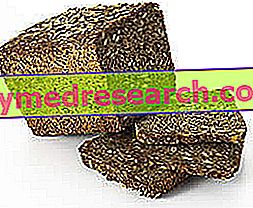What is phytotherapy?
Phytotherapy is the medical science that studies the correct use of medicinal plants and their derivatives, in order to treat or prevent various diseases and conditions of purely medical interest (drugs) or health (supplements). In the study of plant sources, herbal medicine applies the same rules envisaged by scientific medicine, analyzing their chemical constituents and their pharmacological properties through appropriate experiments.

Phytotherapy for weight loss
In spite of the pressing advertising campaigns on the latest natural find to lose more weight faster, phytotherapic substances have not yet been identified that can maintain similar promises, if not at the expense of more or less serious side effects; all this also applies to synthetic drugs and those derived - more or less directly - from natural substances. Moreover, whatever the dietary, pharmacological or phytotherapic therapy undertaken to lose weight, it cannot in any way disregard the preventive lifestyle adjustment.
However, modern phytotherapy includes a substantial list of medicinal plants and active ingredients of plant origin, capable of supporting weight loss induced by lifestyle changes, and preventing and / or treating the negative repercussions of obesity on the health of the individual .
DIURETICS AND LAXIVES
We are probably talking about the category of herbal medicine most improperly used in an attempt to lose weight. The weight losses induced by these natural remedies, in fact, are absolutely "fictitious", because they are linked to dehydration phenomena and not to a real drop in the adipose mass. The medicinal plants that we are going to list, therefore, should be used under medical supervision only when there are real problems of constipation (laxatives) or water retention and mild hypertensive pictures (diuretics). Often, the various diuretic - laxative preparations are used in the form of an herbal tea to exploit the diuretic effect of the "water load".
DIURETIC PHYTOTHERAPIES: Asparagus (rhizome, roots), birch (leaves), cherry (peduncles of fruits), horsetail (aerial parts), ash (leaves and seeds), weeds (rhizome), corn (stigmas or "barbs of corn"), olmaria (flowers), ortosifon (leaves), ononide spinosa, (root), nettle (flowering plant, roots), pilosella (aerial parts), parsley (parts of areas, roots), ruscus or butcher's broom (rhizome), dandelion (root ) goldenrod (flowered tops).
RELAXING PHYTO-THERAPY: Aloe, Senna, Cascara, Frangola, Rhubarb, Castor Oil, Olive Oil and other Vegetable Oils, Dietary Fiber, Fiber Supplements, Bran, Guar and Guar Gum, Karaya Rubber, Psyllium, Agar Agar, glucomannan, laxative foods.
NOTE: dietary fiber supplements, when taken together with generous amounts of water exert - in addition to the aforementioned mild laxative effect - also an anti-hunger action; in addition, they help reduce intestinal cholesterol absorption.
SIDE EFFECTS: the use of diuretics and laxatives for weight loss is very often accompanied by the appearance of unpleasant side effects, such as diarrhea, flatulence, abdominal pain, weakness, fatigue, electrolyte imbalance (hypokalemia), dehydration and - in case of prolonged use - alterations of intestinal bacterial flora (dysbiosis), colonic melanosis, osteomalacia and hypotonic colitis (with consequent chronic constipation).
STIMULANTS, THERMOGENICS, ANORESSISTS AND GALENIC PREPARATIONS
This broad category of phytotherapeutic supplements, often unconsciously associated with synthetic substances such as amphetamines, thyroid hormones and derivatives, is used to increase thermogenesis, or to give an extra boost to one's metabolism. Despite the slimming effectiveness of some substances has been demonstrated several times, the individual who uses phytotherapy to lose weight should first of all be concerned with protecting and promoting their own health; this is because the side effects of naturally derived substances such as ephedrine ( Ephedra sinica ), khat (Catha edulis, from whose leaves an amphetamine drug is obtained), caffeine and yohimbine ( Pausinystalia yohimbe ) are known and documented. At high doses, products containing similar active ingredients cause palpitation, tachycardia, hypertension, insomnia, irritability, anxiety, headache, hallucinations, gastritis, diarrhea and dyspnoea.
STIMULATING PHYTOTHERAPY - THERMOGENIC: bitter orange (unripe fruit), cocoa, coffee (seeds), capsaicin, guarana (seeds), maté (leaves), ephedra (aerial parts), black tea (leaves), green tea (leaves), yohimbe (bark of the stem). The use of algae, such as marine oak (fucus), for slimming purposes, is due on the one hand to the richness in iodine (essential for the synthesis of thyroid hormones) and on the other to the generous content in soluble fibers, such as alginates, which increase the sense of satiety and slow down or even reduce the absorption of nutrients.
FAT BURNING
Although very often we tend to consider the two terms as synonyms, fat-burning supplements should be distinguished from thermogenic stimulants. The former, in fact, are able to directly alter the oxidative lipid metabolism, while the thermogenic increase the energy expenditure of the organism.
The most important representative of this category is garcinia cambogia, whose fat-burning phytotherapeutic properties are mainly linked to the presence of hydroxycitric acid.
FINAL CONSIDERATIONS
The use of herbal medicine for weight loss should be discussed in advance with a specialist, in order to ascertain the absence of contraindications also based on any medicines taken at the same time.



